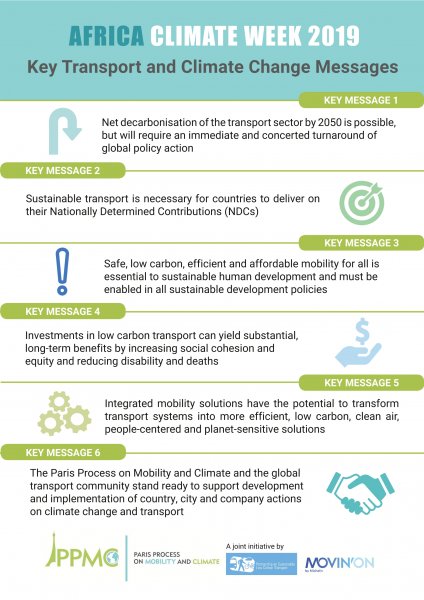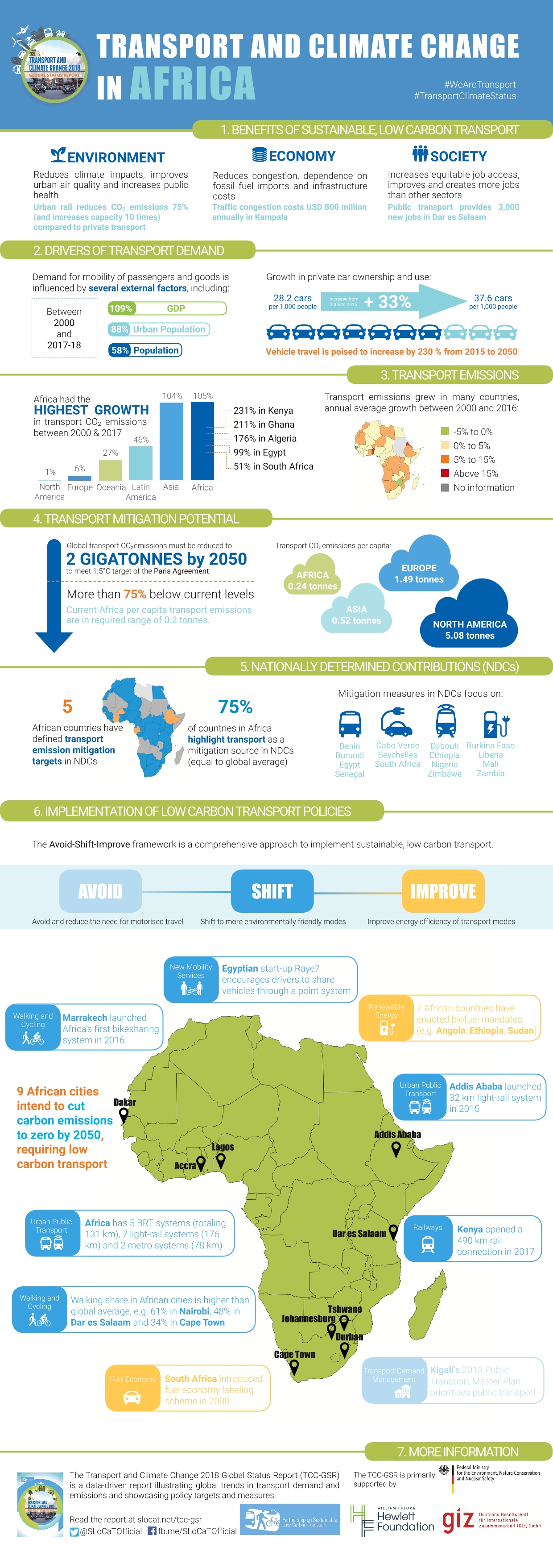
- This event has passed.
Africa Climate Week 2019
18 March 2019 @ 12:00 am
The Paris Process on Mobility and Climate (PPMC), a joint initiative of SLoCaT and Movin’ On, will actively engage at the Africa Climate Week. The regional climate week is from 18 to 22 March 2019 in Accra, Ghana. Please refer to the official website for general information.
Sustainable Transport Events
Events at the Africa Climate Week follow the main themes of cities and local action, nature based solutions, and energy transition, analysing each through the lens of finance, policy, and technology. The week begins with affiliated, invite-only events on 18-19 March, followed by high-level events and thematic sessions on 20-21 March, and finally, a high-level closing plenary on 22 March.
The following invite-only events include a transport dimension:
- Meeting the 1.5˚C challenge through integrated action on air pollution and climate (organised by the Climate and Clean Air Coalition), Tuesday 19 March, 09:30 – 17:15 – Dedicated segment on sustainable transport, featuring Maruxa Cardama (SLoCaT Secretariat), Alphonse Nkurunziza (ITDP Africa), Blake Robinson (ICLEI Africa), Edmund Teko (UN-Habitat), and Ramón Cruz (ITDP)
- Maximising air quality benefits while achieving global climate goals (organised by the Climate and Technology Network and Centre), Tuesday 19 March, 16:00 – 17:00 – Linking climate and air quality at the sectorial level, featuring Ramón Cruz (ITDP)
The following thematic sessions include a transport dimension:
- Technology – Cities and Local Action, Thursday 21 March, 8:30 – 10:55 – Innovative African solutions for improving informal transport, featuring Blake Robinson (ICLEI Africa)
- Technology – Energy Transition, Thursday 21 March, 11:00 – 13:25 – Ghana Bamboo Bikes
- Policy – Energy Transition, Thursday 21 March, 15:30 – 18:00 – Renewable energy’s contribution to transport, particularly in the African context, featuring Laura Williamson(REN21)
- Finance – Cities and Local Action, Thursday 21 March, 15:30 – 18:00 – Dedicated segment on financing sustainable transport, featuring Mayor Manuel de Araújo (Quelimane, Mozambique), Alphonse Nkurunziza (ITDP Africa), and Patrick Oliva (PPMC)
In addition, UNFCCC is facilitating the Pitch Hub, quick and punchy events meant to showcase an organisation’s work around climate action. There are two Pitch Hub events related to transport:
- Transforming Urban Mobility: An Interactive Consultation, Monday 18 March, 13:10 – 13:30
- Transport Decarbonisation Alliance (TDA): Bringing Countries, Cities, and Companies Together for Transport Decarbonisation, Thursday 21 March, 13:00 – 13:25
Key Messages on Transport and Climate Change
During the Africa Climate Week, PPMC is promoting key messages developed in consultation with members and partner organizations:
- Key Message 1: Net decarbonization of the transport sector by 2050 is possible, but will require an immediate and concerted turnaround of global policy action
- Key Message 2: Sustainable transport is necessary for countries to deliver on their Nationally Determined Contributions (NDCs)
- Key Message 3: Safe, low carbon, efficient and affordable mobility for all is essential to sustainable human development and must be enabled in all sustainable development policies
- Key Message 4: Investments in low carbon transport can yield substantial, long-term benefits by increasing social cohesion and equity and reducing disability and deaths
- Key Message 5: Integrated mobility solutions have the potential to transform transport systems into more efficient, low carbon, clean air, people-centered and planet-sensitive solutions
- Key Message 6: The Paris Process on Mobility and Climate and the global transport community stand ready to support development and implementation of country, city and company actions on climate change and transport

Transport and Climate Change in Africa
For the Africa Climate Week, SLoCaT has prepared an infographic outlining the reality of sustainable, low carbon transport in Africa. The infographic shows that transport GHG emissions are growing, driven by population growth, urbanisation, and GDP increase. The number of cars in African countries is increasing rapidly, as high as 33% between 2005 and 2015, due to a lack of public transport and walking and cycling measures. 75% of African countries highlight transport in their Nationally Determined Contributions (NDCs) and various sustainable transport policies are being introduced around the continent.
Please view the infographic here:
